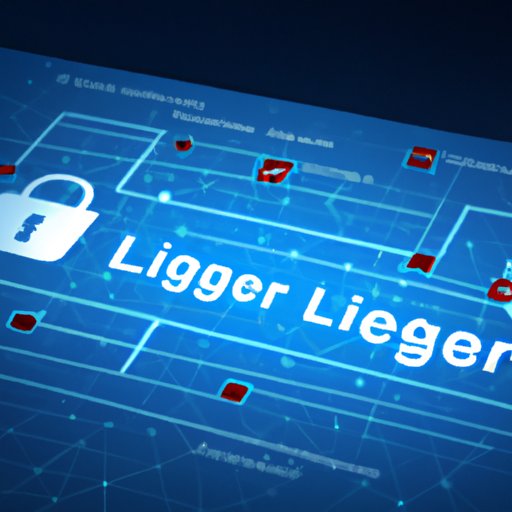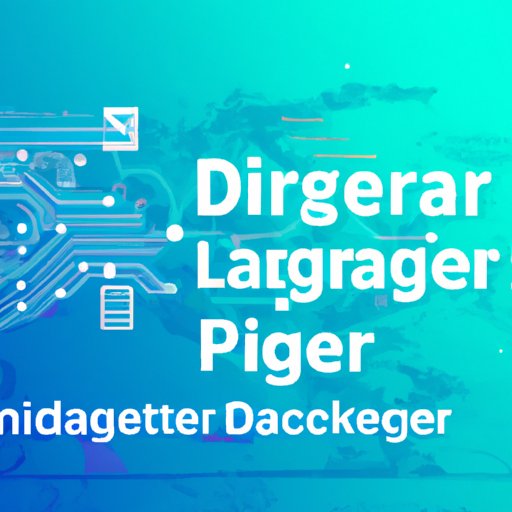Introduction
Digital ledger technology (DLT) is a revolutionary way of storing and managing data. It has been gaining traction in recent years due to its potential to revolutionize the way businesses process and store data. In this article, we will explore what DLT is, the benefits it offers, and its potential applications.

Exploring the Benefits of Digital Ledger Technology
DLT is based on a distributed system which allows data to be stored across multiple computers at once. This decentralized approach provides numerous benefits. Below are some of the key advantages of DLT:
Increased Security
One of the key benefits of DLT is increased security. Since data is stored across multiple computers, it is much harder for hackers to gain access to it. Additionally, DLT can also be used to create digital signatures which provide an extra layer of security for transactions.
Improved Transparency
Another benefit of DLT is improved transparency. All data stored on the ledger is visible to all participants, making it easier to track transactions and verify data accuracy. This makes DLT ideal for use in supply chain management, where it can help ensure that products are sourced from legitimate suppliers.
Streamlined Processes
Finally, DLT can also help streamline processes by reducing the need for manual data entry and verification. This can lead to faster transaction processing times, as well as reduced costs associated with manual labor.
An Overview of Digital Ledger Technology and Its Potential Uses
DLT has many potential applications, ranging from financial services to supply chain management. Here are some of the most notable uses of DLT:
Financial Applications
DLT can be used to facilitate payments, transfer funds, and issue digital currencies. It can also be used to reduce the risk of fraud by providing an immutable record of all transactions.
Supply Chain Management
DLT can also be used to track the movement of goods throughout a supply chain. This can help businesses ensure that their products are sourced from legitimate suppliers, as well as helping them to identify any potential problems quickly.
Smart Contracts
Smart contracts are computer programs that execute automatically when certain conditions are met. They can be used to automate complex business processes such as insurance claims or loan agreements.
A Comprehensive Guide to Digital Ledger Technology
In order to understand how DLT works, it is important to understand some of the core concepts behind it. Below is a brief overview of the key components of DLT:
What is a Distributed Ledger?
A distributed ledger is a type of database that is shared across multiple computers. All data stored on the ledger is visible to all participants, making it easier to track transactions and verify data accuracy.
What is Consensus Algorithm?
Consensus algorithms are used to ensure that all participants agree on the data stored on the ledger. This helps to ensure that the data remains accurate and secure, as any changes must be verified by all participants before they can be made.
How Does Digital Ledger Technology Work?
DLT works by allowing multiple participants to store and share data on a distributed ledger. This data is then secured using consensus algorithms, which ensure that all participants agree on the data stored on the ledger. This makes DLT an ideal solution for businesses looking to securely store and manage their data.
Examining the Impact of Digital Ledger Technology on Businesses
DLT can have a significant impact on businesses, offering numerous benefits. These include:
Increased Efficiency
DLT can help to increase efficiency by reducing the need for manual data entry and verification. This can lead to faster transaction processing times, as well as reduced costs associated with manual labor.
Reduced Costs
DLT can also help to reduce costs by eliminating the need for intermediaries such as banks or brokers. This can result in significant cost savings, especially for businesses that rely heavily on financial transactions.
Improved Compliance
Finally, DLT can help businesses to comply with regulations more easily. By providing an immutable record of all transactions, it can help businesses to demonstrate compliance with various laws and regulations.

How Digital Ledger Technology Can Help Secure Your Data
DLT can also help to improve data security. Here are some of the key benefits of using DLT for data storage:
Enhanced Security Measures
Since data is stored across multiple computers, it is much harder for hackers to gain access to it. Additionally, DLT can also be used to create digital signatures which provide an extra layer of security for transactions.
Improved Data Integrity
Data stored on a distributed ledger is immutable, meaning it cannot be changed or deleted. This helps to ensure that data remains accurate and intact, even if it is accessed by unauthorized users.
Improved Data Privacy
DLT can also be used to protect data privacy. For example, it can be used to encrypt data so that only authorized users can view it. This can help to prevent the unauthorized sharing of sensitive information.

The Future of Digital Ledger Technology and Its Applications
DLT is still in its early stages, but it has the potential to revolutionize the way businesses store and manage data. Here are some of the areas where DLT could have the biggest impact in the future:
Interoperability
DLT could enable different systems to interact and exchange data more easily. This could make it easier for businesses to integrate with new technologies and create more efficient systems.
Automation
DLT could also be used to automate complex processes such as loan agreements or insurance claims. This could reduce the need for manual labor and lead to faster transaction processing times.
Machine Learning
Finally, DLT could be used to facilitate machine learning. By providing an immutable record of transactions, it could help machines to learn from past data and make better decisions in the future.
Conclusion
Digital ledger technology is an innovative way to store and manage data. It offers increased security, improved transparency, streamlined processes, and other advantages for businesses. As DLT continues to evolve, it could revolutionize the way businesses store and manage data. From automated processes to enhanced security measures, DLT could have a major impact on businesses in the future.
(Note: Is this article not meeting your expectations? Do you have knowledge or insights to share? Unlock new opportunities and expand your reach by joining our authors team. Click Registration to join us and share your expertise with our readers.)
